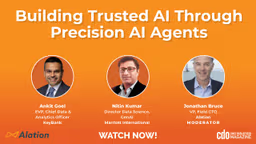Industry Newsroom
Voya Financial, SVP, Head of Data, Architecture and Salesforce Development: Reusable Resources Drive Data Governance Value2
Written by: CDO Magazine Bureau
Updated 8:08 AM UTC, Tue April 29, 2025


Julia Bardmesser.jpg
Julia Bardmesser, SVP, Head of Data, Architecture, and Salesforce Development at Voya Financial speaks with Peter Ku, VP and Chief Industry Strategist at Informatica, about the importance of data as a business driver, and pursuing a career in data today.
Bardmesser begins the discussion with the data governance strategies that drive business in the present scenario and factors that drive new investments in data management for digital transformation.
She focuses on ROI as a prime driver stating, "ROI is still a question and especially when you start a new program or data management, data governance, or even digital transformation as something that is a new concept for the company."
During her initial years at Voya, she recalls spending a lot of time trying to define the value of data programs in business terms. Although she does not need to do it anymore, it was a task, says Bardmesser. She approaches the data aspect from the business driver perspective, which starts with empowering the customer, improving customer experience, enhancing decision-making, and driving business strategy. These are the factors that determine the direction in which the business needs to be going, she says.
Elaboration on the need for data through each factor, she explains, "How do you improve your customer experience? You need data for that. And how do you make good decisions about which products do well, and which products don’t do well? How do you make any type of business decisions that you need to make that was financial and product-related and investment-related? We need data for that."
Highlighting the business strategy angle, she urges to understand which strategy would resonate in the market. She mentions that although the cloud enables failing fast, the business would require data to learn the success and failure parameters.
Bardmesser stresses the need for data in all aspects, be it data integration, data management, or data quality. She states, "If you are looking for that set of data, you need to be able to define, you need to have a fairly easy-to-use interface where you can find the data in the business terms and then go all the way to where it lives physically, technologically, and then how all this data connects."
Emphasizing further the importance of common keys, she talks about master data management. Referring to Informatica, she states that they have been doing master data management since much before then she knew the term, but then a problem still exists with it and beyond it as well.
She then speaks about privacy factors and ESG is one of the most important topics that are all about data and the metadata around the data. She asserts that making these connections generate a lot of ROI and some of which has been quantified over time and some of it revolves around efficiency.
In the context of efficiency, Bardmesser states, "It’s 80 point rule, 80% of the time people could be reporting or looking for the data. If the data is there and they can find it and then understand the quality, it’s not 80 points. Now they spent 80% of the time doing analysis, providing decision-making reports, doing analytics, predictive modeling, and 20% of the time looking at the data."
The latter, she affirms, leads to more data generation out of the resources and the reusable capabilities are a huge driver of the data platform value and data governance value. However, she adds that there is no need for rebuilding, and it can be done according to the company’s strategy. She further states, "I don’t think there are many companies out there today in financial services or outside where there is a business strategy that’s not dependent on data."
Addressing the younger generation of data enthusiasts, Bardmesser advises them to go for a career in data. She means that there a multiple rooms for talent in the realm of data by stating, "If it’s somebody who is incredibly technical and wants to get into the deepest nuts-and-bolts, there is so much around data that you can get into and have a huge career doing this. Also, if you are more interested in solving business problems, there is a huge room for that as well." She also invites people who understand both business and technology aspects of data to choose the field as many technical problems need to be solved from an AI and ML perspective.
In conclusion, Bardmesser states that, as data drives the business, the data operators are not in the background or invisible anymore. She uses the analogy of cloistered nuns here to define how data operators were before. However, the present scenario is different as data envelopes everything. She adds, "There is a lot of business strategy that’s reliant on data analytics. About 10 years ago, it was a much more technical discipline and not a lot of interaction with the business. I think that’s changed dramatically within the last five years, and I think it’ll continue changing."





